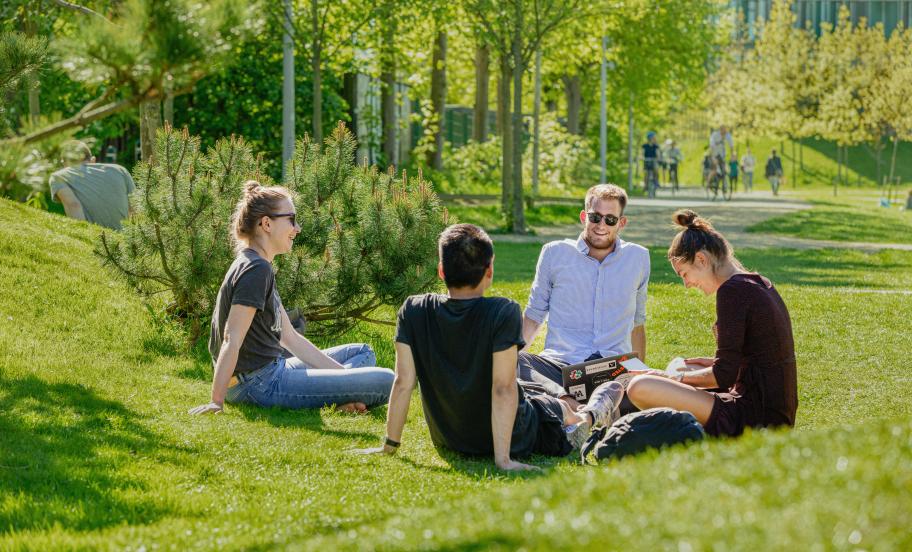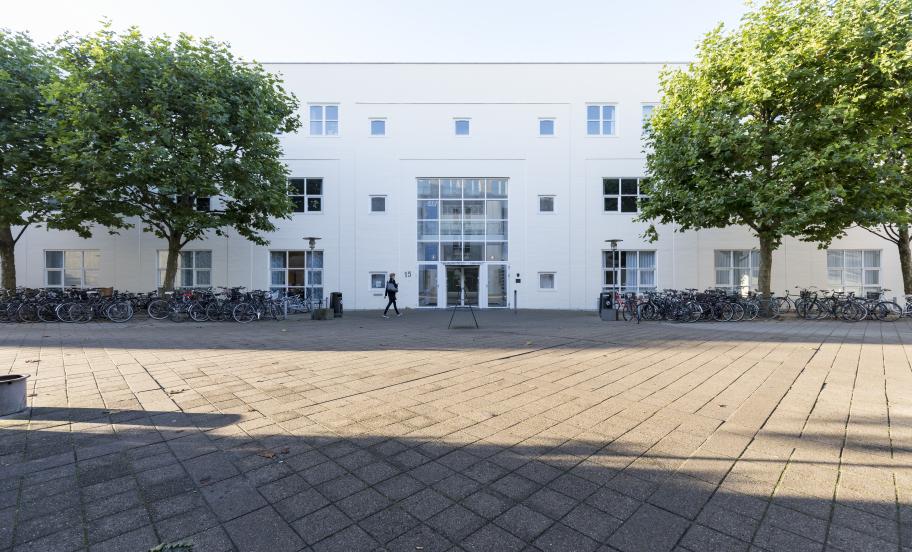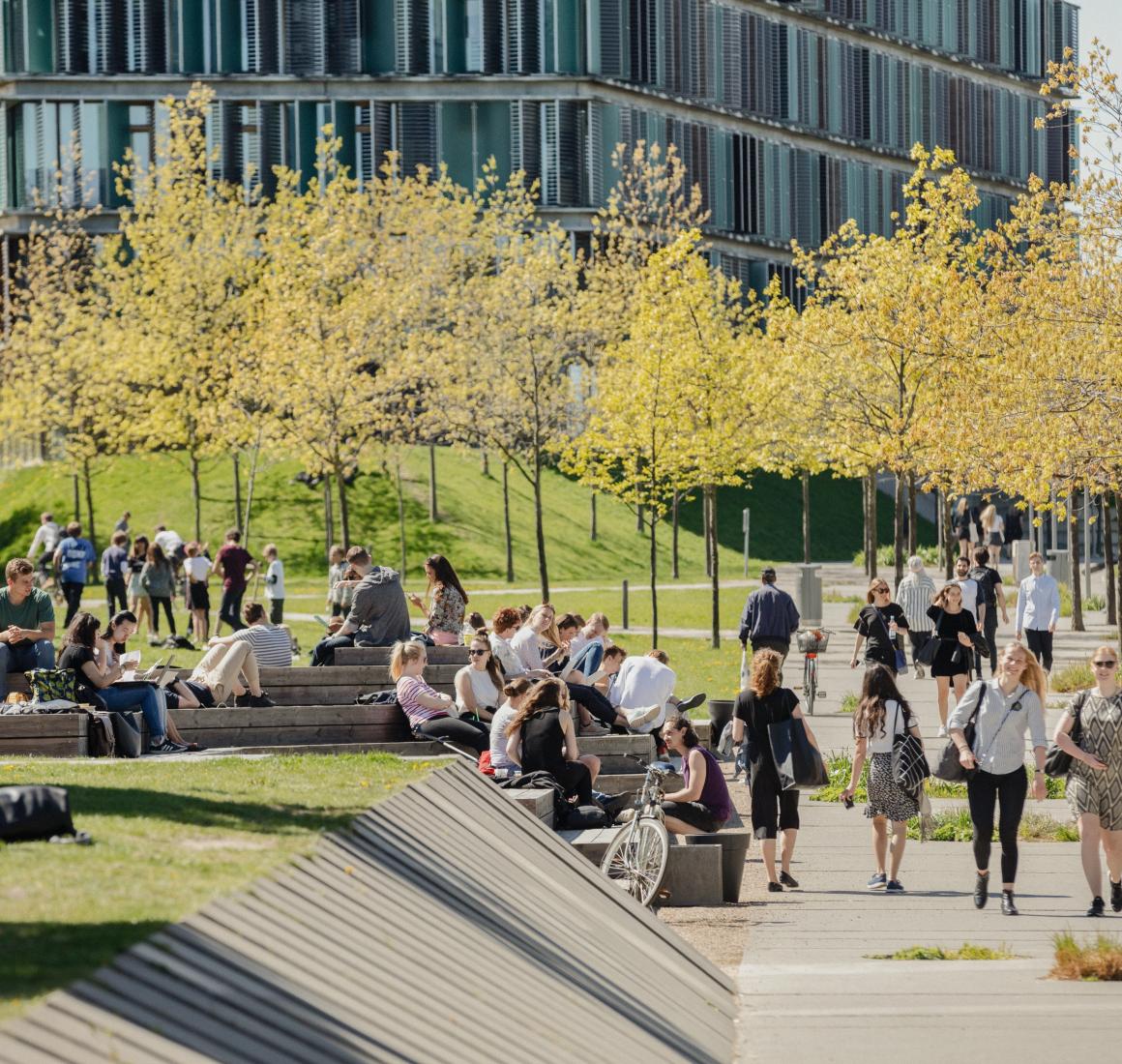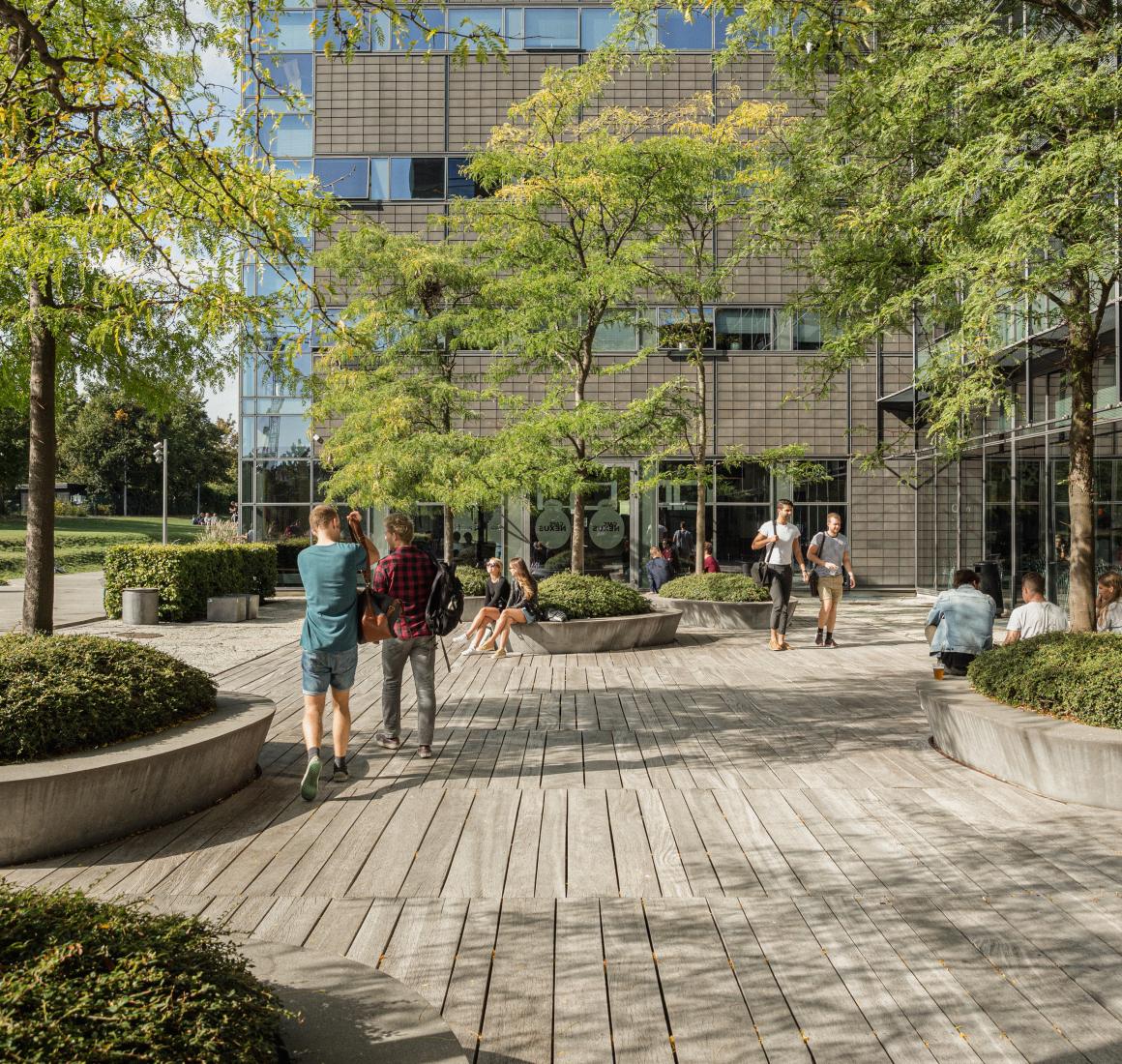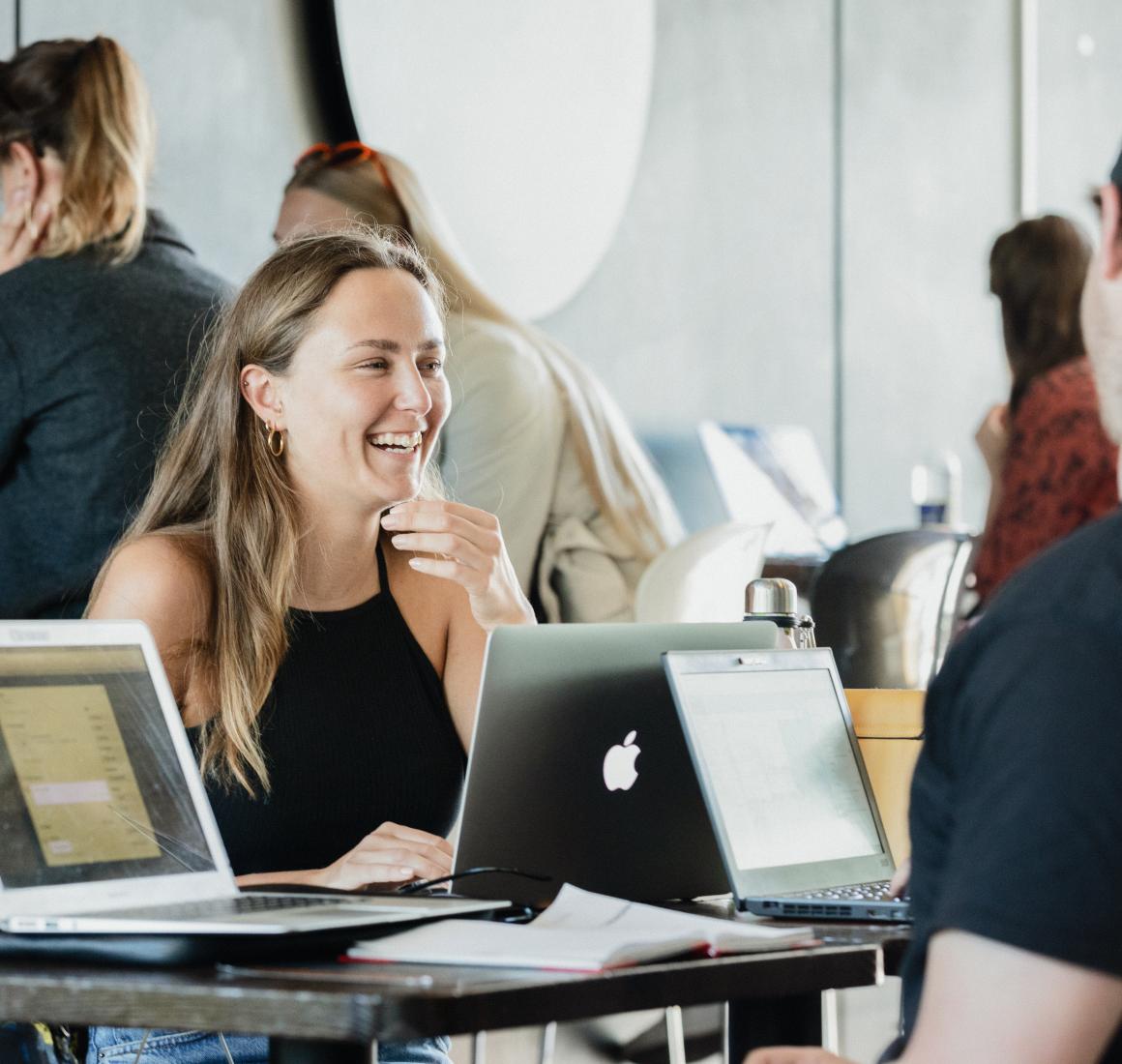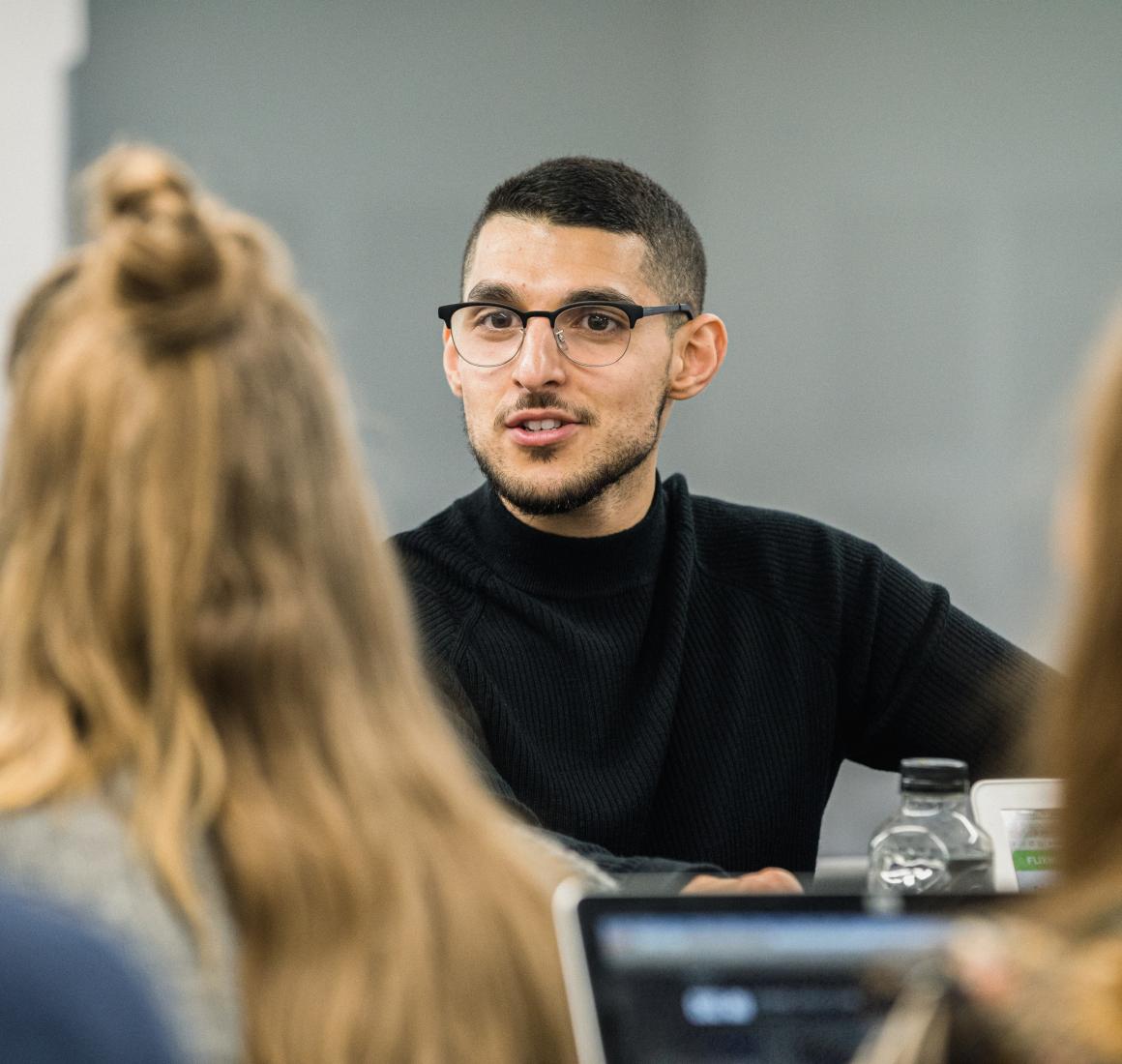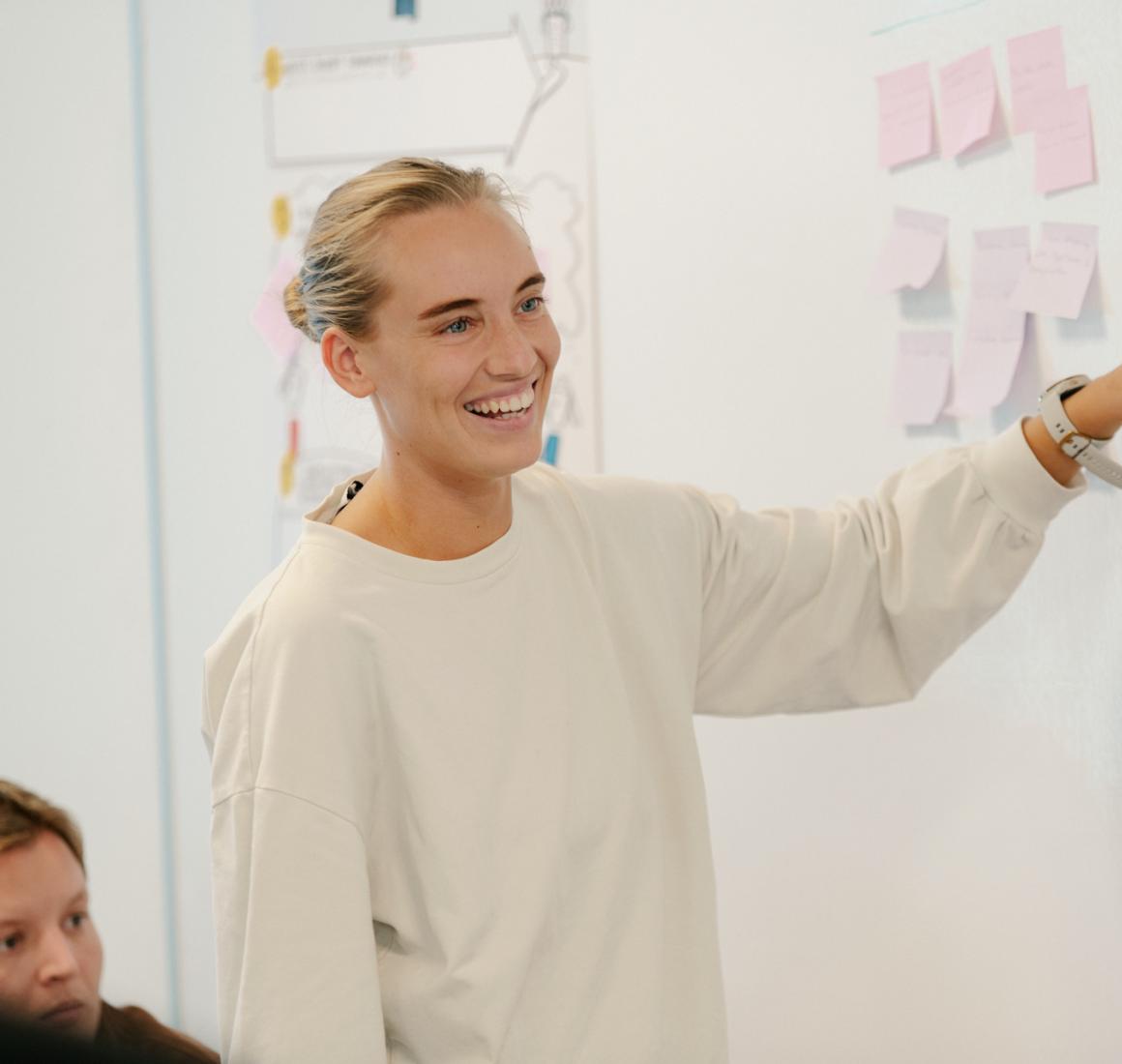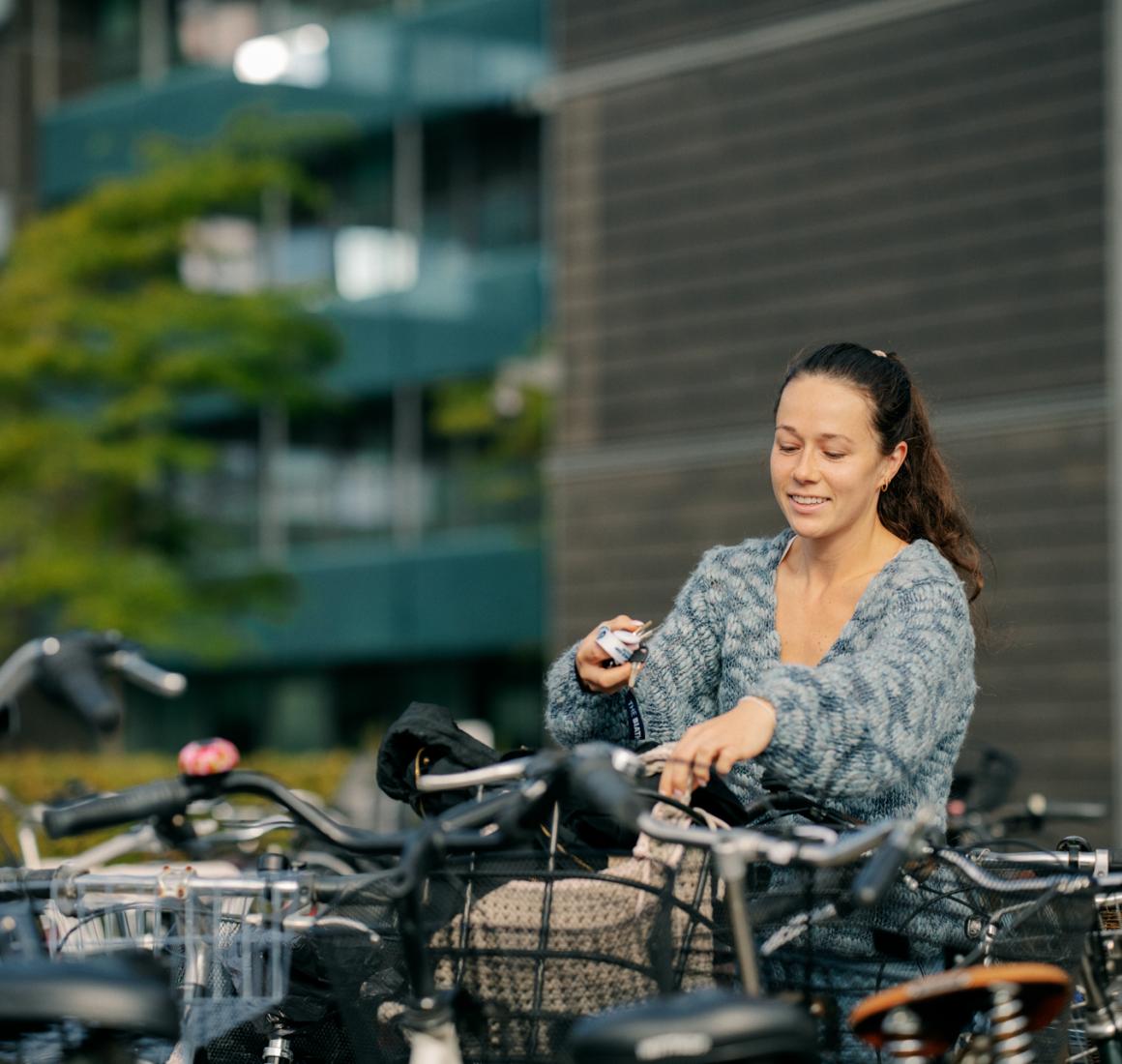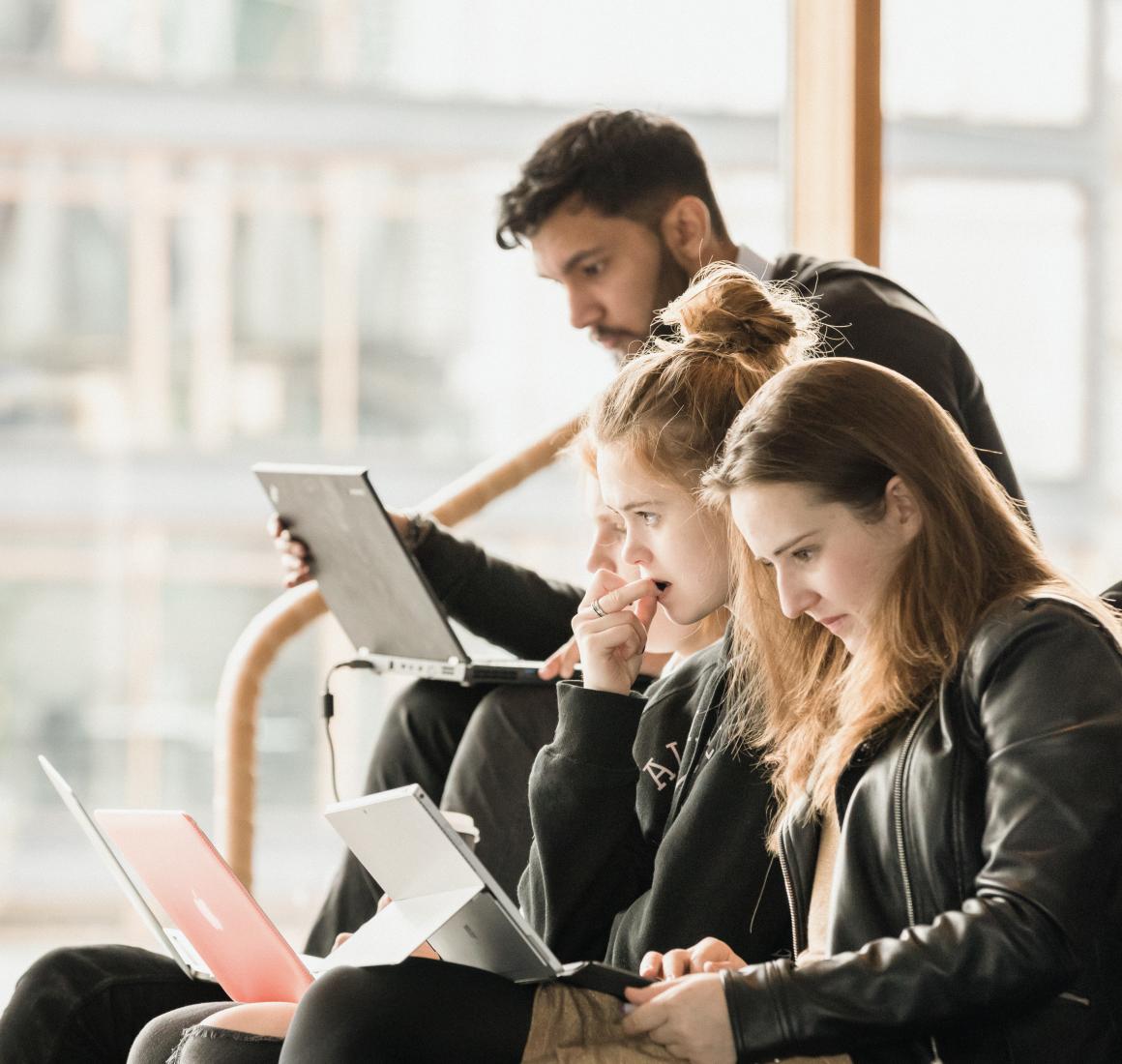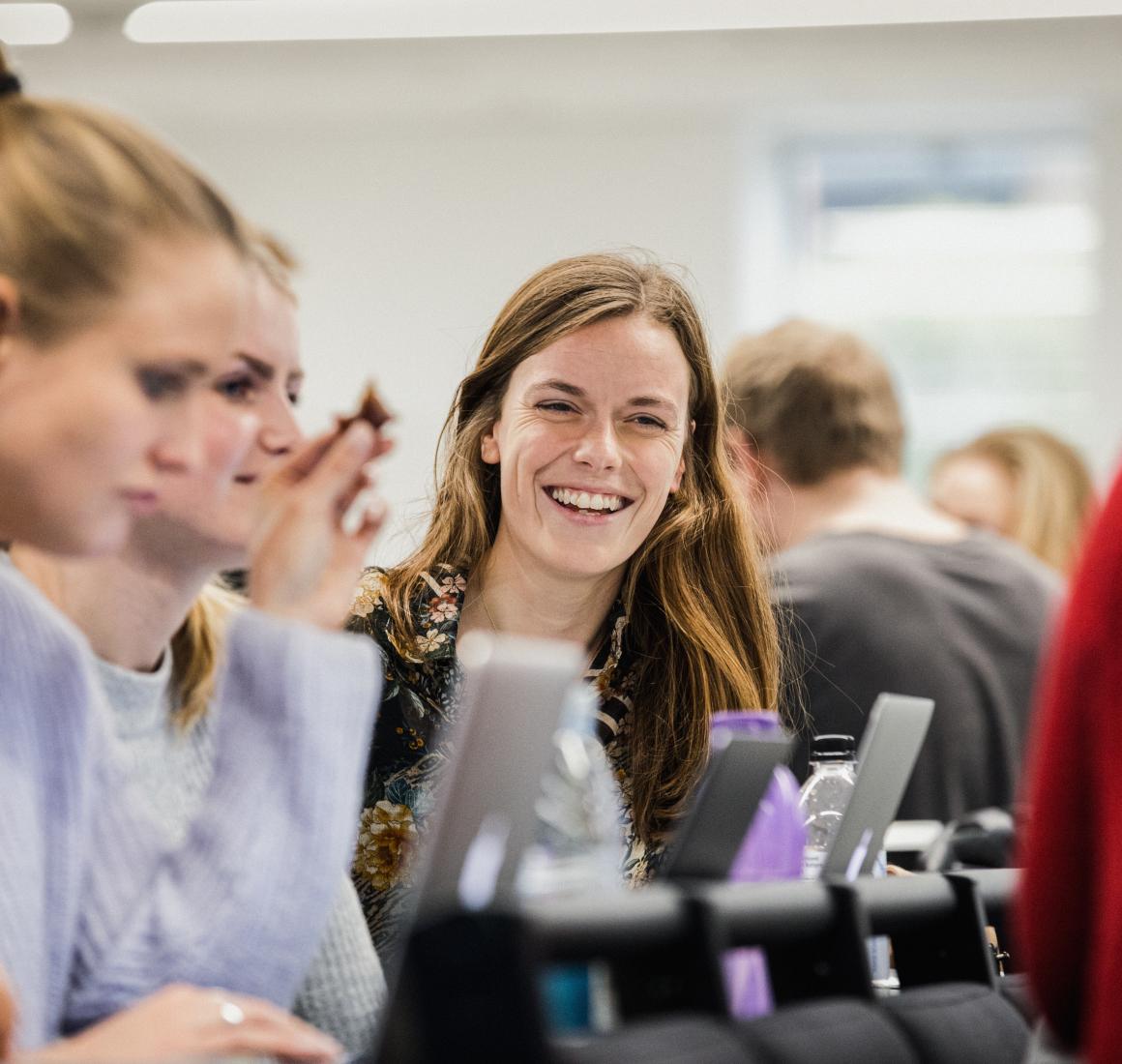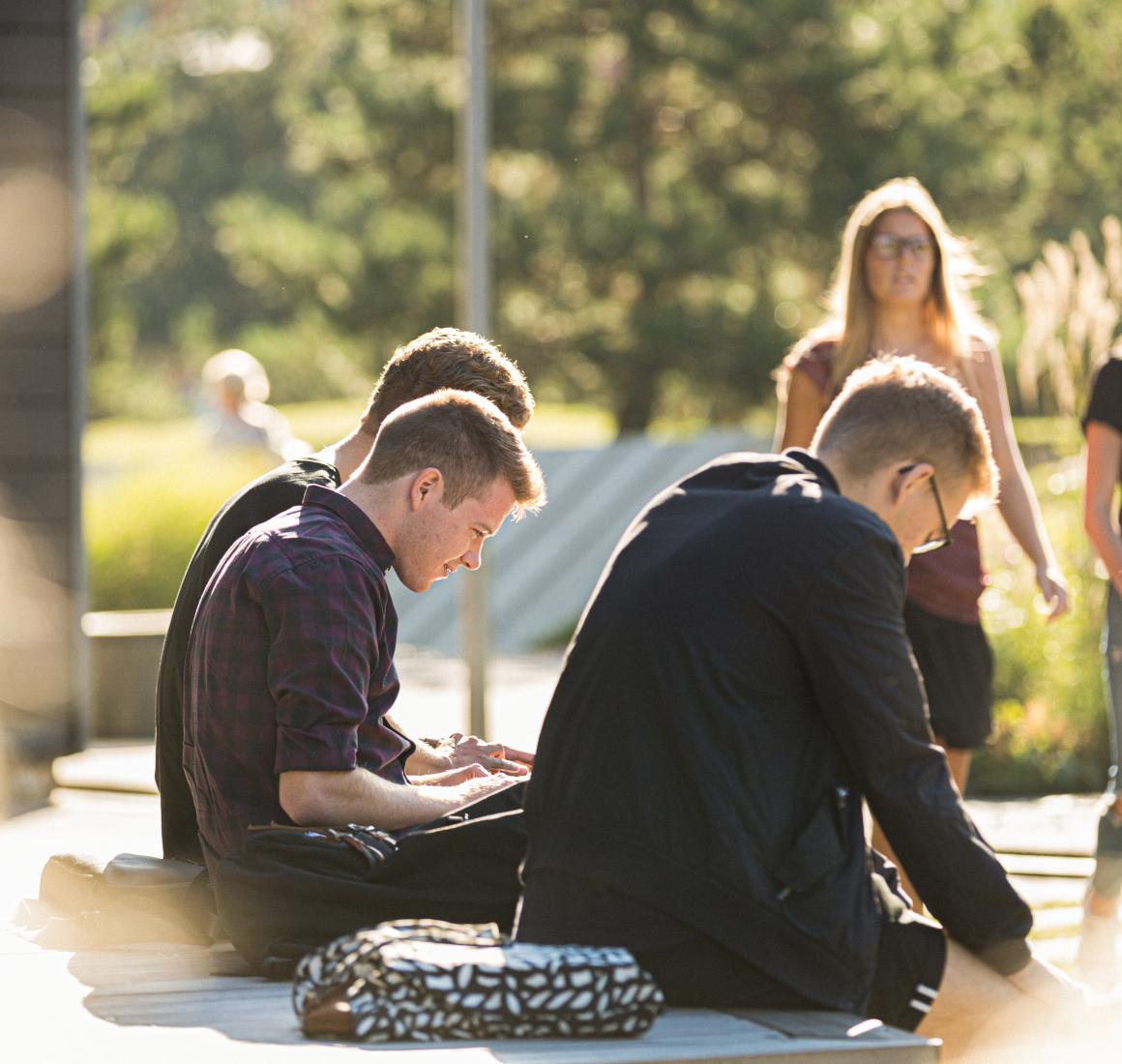Department of Management, Society and Communication
A transdisciplinary hub for studies of business in society

About the department (Panel content)
Who we are
M anagement
S ociety
C ommunication
News and events at MSC
What we do
Scroll down to read more about MSC
- our staff and management,
- our strategy and history,
- our outside collaboration and societal impact

At the Department of Management, Society and Communication, we
- explore the conditions and practices of responsible management, organisation and governance in a globalised world characterised by both deep interdependencies and growing tensions
- focus on how companies and other organisations engage with issues related to sustainability, digitalisation, inequality and global developments
- teach across a wide range of study programmes, translating and disseminating our research and expertise to different audiences
- engage with companies and other organisations, communicating findings and co-creating new insights with practitioners in business and society
About us
Our MSC environment
MSC brings together more than 100 full-time staff engaged in cutting-edge research and teaching, alongside around 100 part-time lecturers who enrich the classroom with valuable professional experience. A dynamic PhD community continuously feed into the research environment, as new projects begin and graduates move on to new opportunities. Our 12 dedicated administrative staff ensure smooth daily operations and provide essential support to both faculty and students.
MSC has a vibrant research and teaching environment and is characterized by collaboration across CBS as well as nationally and internationally, with visiting researchers from all over the world regularly hosted by the department. Externally funded projects enhance the exploration and dissemination of new research ideas, and collaboration with external stakeholders ensures channels for its impact in society.
MSC Leadership
MSC’s Leadership Group as per 1 December 2025 consists of
- Head of Department Dorte Salskov-Iversen
- Head of Secretariat Annika Dilling
- Vice Head of Department Professor Hans Krause Hansen
- VIP Teaching Coordinator Associate Professor Rasmus Koss Hartmann
- External Funding Coordinator Professor Janine Leschke
- PhD Coordinator Associate Professor Thilde Langevang
The Leadership Group regularly consults with the MSC Department Forum which consists of representatives of the various position categories in the department.
Our history
Today’s Department of Management, Society and Communication is the result of the merger, in 2017, of the then Department of Intercultural Communication and Management and the Department of International Business Communication.
Both these departments had, in very different ways, roots in CBS’ early efforts in the 1980s and 1990s at embracing interdisciplinarity, establishing environments that were tasked with adopting a more problem oriented approach to research and teaching, leveraging the potential of bringing on board perspectives from the broader social sciences and humanities to explore business in society.
Academic organisation and approach
Multi- and interdisciplinary by design, our research and teaching are informed by management and business studies as well as the broader social sciences and humanities.
Our researchers are affiliated with at least one of four research environments (two centres and two clusters with a number of subgroups). The environments constitute the primary internal anchorages for our researchers and their projects, addressing responsible management of business in society:

MSC strategy
It is MSC’s mission to generate novel and impactful research on the dynamic relations between business and society and the responsible management thereof.
Moving forward, we aim to further develop and demonstrate the (trans)formative potential of operating in precisely this space, being the one department that explores it, research and teaching wise, at the interface between sustainability, digitalisation, inequality and global developments.
Information for part-time teachers
Collaboration and outreach


Research environments at MSC
There are four main research environments at MSC: our two centres, Centre for Sustainability and Centre for the Study of Business and Development Studies, and our two research clusters, the Communication, Organisation and Governance (COG) cluster, and Technology and Society (TechSoc). Click on them below to go directly to their webpages.
Research and publications (Panel content)
Our research
Our research critically explores the roles of business and societal actors in addressing global challenges. We examine how companies and other organisations engage with issues such as sustainability, digitalization, inequality, and global development - investigating practices, responsibilities, constraints, and opportunities to create outcomes of mutual benefit.
Our work challenges conventional business thinking by interrogating power relations, culture, communication, and sustainability practices across diverse global and local contexts. Conceptually informed and empirically grounded, we apply both qualitative and quantitative methods. Our interdisciplinary research is collaborative in nature, spanning CBS and international academic networks.
Our research environments
Other MSC initiatives
Externally funded projects
PlantTip - Modelling societal transitions and tipping points for the green transition of food consumption
The project:
The PlantTip project aims to investigate societal tipping points in consumer behaviour in Denmark, with a focus on accelerating the green transition towards a sustainable food system.
The aim of PlantTip is to experiment and predict how policy instruments, marketing measures, consumer-oriented innovations, and social dynamics can be combined to trigger societal tipping points. The project employs an innovative approach of developing (a) agent-based models based on (b) social-behavioural experimentation data.
Large-scale and accelerated dietary change could crucially contribute to GHG emission reduction in Denmark. However, the current rate of change towards more sustainable diets is far too slow and restricted to niches. Societal tipping points must be reached to accelerate the needed changes, but we lack knowledge on how to predict and foster large scale behaviour change.
Current approaches overemphasise solutions that change food, but not the food-eaters. We argue that a complex systems change is necessary, which this project initiates, by identifying actionable insights about instruments, innovations and social dynamics that can trigger societal tipping points.
Collaborative partners:
PlantTip is a joint project of Copenhagen Business School, Aarhus University and Democracy X, and collaborates with, amongst others, the Stockholm Resilience Centre and the chair of International Political Economy and Environmental Politics, ETH Zurich.
MSC project team:
The project team at MSC consists of Associate Professor Meike Janssen and the postdoctoral researchers Alice Pizzo and Giulia Priolo.
The grant:
The project is funded by the Novo Nordisk Foundation (9.8 mio DKK), and runs from April 2025 – June 2028
For further information, please contact Meike Janssen, mj.msc@cbs.dk.
Cir4Fun
The project:
The European furniture industry is transitioning towards sustainability and circular practices, driven by the need for regulatory alignment and standardisation. The EU-funded Cir4Fun project will enhance furniture sustainability by introducing digital product passports (DPP) and promoting eco-labelling. It will create a circular economy roadmap, develop eco-design guidelines and establish innovative business models. The project will also devise new methodologies for assessing maintenance, reparability, refurbishment, remanufacturing and recyclability. These insights will be integrated into an interoperable furniture assessment system (FAS), featuring a sustainable index system, developed with the support of life cycle assessment, life cycle costing and social life cycle assessment under a Furniture Data Space. Cir4Fun will actively engage stakeholders to foster sustainable behaviours, advancing the industry’s shift to circularity.
Project team:
Isabel Froes and Sebastian Olsson
Collaborative partners:
• INSTITUTO TECNOLOGICO METALMECANICO, MUEBLE, MADERA, EMBALAJE Y AFINES-AIDIMME
• ETHNIKO KENTRO EREVNAS KAI TECHNOLOGIKIS ANAPTYXIS
• UNINOVA-INSTITUTO DE DESENVOLVIMENTO DE NOVAS TECNOLOGIAS-ASSOCIACAO
• POLITECNICO DI MILANO
• FRAUNHOFER GESELLSCHAFT ZUR FORDERUNG DER ANGEWANDTEN FORSCHUNG EV
• COMMISSARIAT A L ENERGIE ATOMIQUE ET AUX ENERGIES ALTERNATIVES
• XGILITY LIMITED
• F6S EU TECH INNOVATION NETWORK DESIGNATED ACTIVITY COMPANY
• F6S NETWORK LIMITED
• KENTRO IKANOTITON GIA TIN VIOMICHANIA 4.0 APO TO SCHEDIASMO STIN YLOPOIISI IDIOTIKI KEFALAIOUCHIKI ETAIREIA
• SONAE ARAUCO PORTUGAL SA
• MICUNA FAMILY BRANDS S.L.U.
• Kave Home SL
• OPENDOT SRL
• CENTRO PARA A VALORIZACAO DE RESIDUOS ASSOCIACAO
• Pozzi Arturo S.p.A. TESSITURA JACQUARD
• ELLINIKI DIAHEIRISI APPRIMATON ANONYMI ETAIRIA - ELDIA
• MUNICIPIO DE GUIMARAES
• FEDERACION EMPRESARIAL DE LA MADERAY MUEBLE DE LA COMUNIDAD VALENCIANA - (FEVAMA)
• ENOSI KATANALOTON POIOTITA TIS ZOIS
• SARA SA
• SCUOLA UNIVERSITARIA PROFESSIONALE DELLA SVIZZERA ITALIANA
The grant:
EU, Grant agreement ID: 101182081. Start date: 1. January. 2025. End date: 31. December 2027.
For more information, please contact Sebastian Olsson at seo.msc@cbs.dk
Vision4Food
The project:
The VISION4FOOD project is envisioning an integrated quadruple helix and RRI framework for food system transformation and regional innovation ecosystem enhancement. It brings together 13 partners from 8 countries, united by a shared mission: to transform and strengthen the sustainability and resilience of EU food systems.
The project is collaborating across 5 diverse regions - Finland, Spain, Italy, Greece, and Poland - to develop innovative governance models that empower local food systems. By uniting Quadruple Helix stakeholders, we're enabling the creation of Food Innovation Platforms (FIPs) designed to scale innovations and drive transformative change in food systems.
Vision4Food approach focuses on co-creating research and innovation strategies, promoting open science, and ensuring Responsible Research Innovation (RRI). Each region will receive tailored support for knowledge exchange, networking, and priority setting, accelerating the transition to more inclusive, innovative, and sustainable food systems.
MSC project team:
Isabel Froes, Albina Dioba
The grant:
The European Research Executive Agency (REA) under grant agreement No° 101183145. Funded by the European Union, 01.01.2025 - 31.12.2027.
For more information, please visit the project's website.
The seizmic Doctoral Network
The project:
The seizmic Doctoral Network is a project funded by the Marie Skłodowska-Curie Actions (MSCA) with the aim of advancing the understanding and practice of scaling social entrepreneurship.
To address this challenge, seizmic integrates research and practitioner expertise in impact investing, business models, education, and Digital Ecosystems and AI, bringing together universities and industry partners to train a new generation of scholars.
MSC project team:
Kai Hockerts (Principal Investigator), Ricky Celenta (Project Manager), Esben Rahbek Gjerdrum Pedersen, Liana Razmerita, Kristian Roed Nielsen and Anne-Karen Hüske
Collaborative partners:
The beneficiaries of the seizmic Doctoral Network include Aalborg University, ESCP Business School Berlin, Karazin University, Université Paris-Est Créteil (UPEC), University Federico II Naples, University of Iceland, University of Innsbruck, and University Rovira i Virgili in Catalonia.
The network also includes several associate partners, such as Aurora, Babele, Den Sociale Kapitalfond, Eranos, the Executive Committee of Boiarka City Council, the Iceland Ministry of Education, Impact Hub Berlin, KLAK, Ship2B, and the Società per l’Innovazione, la Cooperazione e l’Internazionalizzazione (SPICI srl).
Grantor:
This project has received funding from the European Union’s Horizon 2020 research and innovation programme under the Marie Skłodowska-Curie grant agreement No 101169098.
Project duration: October 2024 - October 2028
For more information, please contact rc.msc@cbs.dk
SENSOPAD
The project:
The SENSOPAD project aims to transform women’s health by tackling the challenges of early Endometriosis (ED) detection, a condition often underdiagnosed. By introducing innovative, user-friendly devices that monitor ED indicators during the menstrual cycle, SENSOPAD offers a seamless combination of at-home convenience and clinical accuracy. Through a mobile app and AI-enhanced cloud platform, the project aims to reduce the typical ED diagnosis time from years to days, enabling earlier treatment and improving women’s health outcomes. This initiative promotes proactive, informed, and accessible healthcare for women worldwide.
As a task leader, CBS will guide the qualitative research process, conducting interviews with clinicians and menstruators and gathering user stories. CBS will also lead a large-scale European study to identify drivers and barriers to product adoption, ensuring the product meets the needs and preferences of diverse user groups.
MSC project team:
Angelos Stamos, Isabel Froes, and Amalia Giannakopoulou.
The grant:
The project is funded by the EU Horizon Europe Research and Innovation Program with a total budget of €6.8 million. It started in September 2024 and will run until August 2028.
Grant agreement ID: 101130516
For more information, please contact Angelos Stamos (asta.msc@cbs.dk)
FRONTIERS: Frontiers of natural resource and sustainability governance for a just energy transition
The project:
Advancing knowledge for a just transition involving and respecting those at risk or in practice adversely affected by transition minerals mining, the FRONTIERS project explores practices in the mining industry and how institutional investors can shape that industry and its impact. Looking at land-based and potential deep-sea mining (DSM), we focus on effects and synergy of risk-based due diligence demands and Rights of Nature claims.
With the aim of developing knowledge that can serve towards a just and fair transition, FRONTIERS aims at developing novel insights into good practices that may serve as inspiration or guidance for various types of actors and stakeholders (human individuals and communities, organisations, and ‘more-than-human’ stakeholders, such as the environment and nature). As part of this, we explore how due diligence and forms of engagement in diverse organizational, normative and regulatory settings can contribute to giving a voice to affected stakeholders, whether human or ‘more-than-human’.
For more details, please see https://frontiers.cbs.dk/
Project team:
For details, please see https://frontiers.cbs.dk/en/core-team/
PI: Professor Karin Buhmann
Jakob Lutz, PhD candidate
Helga Askgaard Estrup, PhD candidate
Postdocs: currently being recruited.
Collaborative partners:
VISITING SCHOLARS
FRONTIERS will involve collaboration with several visiting scholars. These include Dr. Samantha Goethals, SKEMA Business School, France, and expert in risk-based due diligence; Professor Kristina Siig, University of Southern Denmark, an expert in maritime and private law; and Dr Kevin Lo, an expert in Environmental Politics, Environmental Governance, Political Geography, Urban Geography, China;
ACADEMIC ADVISORY BOARD
FRONTIERS will benefit from the expertise and suggestions from an interdisciplinary Academic Advisory Board:
Prof. Björn Fasterling, Professor in Law and Business Ethics, EDHEC Business School, France. Expertise in corporate sustainability due diligence in soft and hard law, business governance, and business ethics.
Dr. Claire Bright, Associate Professor, founder and director of the Centre for Business, Human Rights and the Environment (BHRE) at NOVA University, Lisbon. Expertise in EU law on corporate sustainability due diligence, just transitions, legal method including doctrinal studies.
Prof. Ola Mestad is Professor in public law and Director of the Scandinavian Institute of Maritime Law, University of Oslo. Expertise in international law including Law of the Sea; energy and natural resource extraction law; sustainable investing; Indigenous and community rights.
Prof. Mark Stoddart, Professor in Sociology, Memorial University, Canada. Expertise in
eco-politics, social movements, and environmental governance in relation to climate change and energy, including methodology for field work and interdisciplinary research.
OTHER PARTNERS
The FRONTIERS research team will collaborate closely with several national and international partners. These include:
AkademikerPension, a Danish pension fund which is globally leading in sustainable finance.
Professor Claudia Marconi, is a political scientist and international relations scholar and lead of the Jean Monnet Centre of Excellence on Business and Human Rights at FECAP Business School, Sao Paolo, Brazil. Established in 2023 with funding from the European Commission, the centre is the first-ever Centre of Excellence on Business and Human Rights.
Dr. Alberto Fonseca, Associate Professor at the Federal University of Ouro Preto, Brazil. Fonseca is an expert in environmental and social impact assessment, with a back-ground in engineering and planning and a social science methods leaning, and a former president and scientific director of the Brazilian Association for Impact Assessment.
Project start and end year, and funding sources:
The project runs April 2024-March 2029. The project budget of DKK 9,996,438 is funded by the Semper Ardens Accomplish modality (Carlsberg Foundation). The Office of the CBS Dean of Research contributes another 10 % of that amount towards internal administrative costs etc.
For more information, please contact the PI, Professor Karin Buhmann (kbu.msc@cbs.dk) and visit https://frontiers.cbs.dk/en/
More to follow ...
xxx
Publications
See all publicationsJune 2026
The Development of Students’ Thinking Skills
Perspectives From Higher Education Instructors in Japan, Europe, and Australia
Emmanuel Manalo
Maribel Blasco, Associate Professor
Rebeca Cerezo
Rachel Dryer
Tamim Elbasha
Rei Hirayama
Natalia Suarez Fernandez
Ayano Tsuda
June 2026
China’s Technological Catch-Up and Leapfrogging in Electric Vehicles
A Firm-Level Study of BYD and CATL

Lindsay Whitfield, Professor
Tobias Wuttke
April 2026
From Grand Challenges to Bold Solutions
Investor Perspectives on Financing Urban Climate Change Adaptation
Stella Whittaker, External PhD affiliation
Craig Johnson
Nicola Ranger

Esben Rahbek Gjerdrum Pedersen, Professor
Education (Panel content)
Our contribution to programmes and courses
MSC contributes to programmes across CBS, with an emphasis on management, sustainability, communication, technology, and international business. Much of our teaching emphasises responsible management, organisation, and governance in a world transformed by globalisation, technology, and environmental degradation.
We bring to our classrooms a particular concern with culture, communication and context to understand and critically reflect on the interaction and interdependencies of business and society. MSC staff are at the forefront of developing new and innovative teaching formats, especially in light of the possibilities and challenges of online teaching, artificial intelligence, and digital media.
While MSC contributes to courses across programmes at the bachelor, Master and Executive level, our research environments are particularly strongly represented in some particular programs.
At the bachelor level, our faculty play large roles in CBS’ BSc. in Corporate Communication, the BSc. in Market and Cultural Analysis, the BSc. in Business administration and Psychology, the BSc. in Business, Language and Culture, and the BSc. in Digital Management.
At the master’s level, we contribute extensively to the MSc. in Strategy, Organization and Leadership and the MSc. Sustainability minor and the MSc. Environmental, Social, Governance minor.
Looking for information about our PhD environment?
Scroll down and find it further down this page!
Bachelor programmes
Bachelor programmes to which MSC contributes
Master programmes
Master programmes to which MSC contributes.
Executive master programmes
Executive master programmes to which MSC contributes
Our Ph.D. programmes
The MSC PhD environment
At MSC, PhD students join a vibrant, international and interdisciplinary research community exploring the complex interplay between business and society. We host 20–30 PhD students, supervised by leading scholars across management, communication, sustainability, technology, development studies, and governance.
Through our portfolio of PhD courses, PhD students advance their knowledge of theories and methods tailored to their projects. MSC’s strong interdisciplinary orientation ensures both academic depth and breadth, preparing PhD candidates to address the pressing challenges of business and society.
MSC offers a supportive and collegial culture that integrates PhD students into all aspects of academic life. All PhD candidates are affiliated with one of the department’s research centers or clusters and take part in two work-in-progress seminars with expert discussants, annual PhD days, and regular research seminars.
Informal activities such as lunches, peer gatherings and social events foster community spirit and create space for exchange.
MSC predominantly recruits PhD students on a 3-year scheme, funded through CBS, external research grants, industrial PhD collaborations, or partnerships with other academic institutions.
Being a PhD Student at MSC
Being a PhD student at MSC means joining a vibrant interdisciplinary community where mentorship extends well beyond your supervisors. Seminars, peer feedback, and informal exchanges create a culture of openness. From early abstract ideas to full manuscripts, there is always someone ready to listen, support, and push you forward. Our doctoral community ensures that you never feel alone in this journey.
Ahaana Mahanti, MSC PhD student
Career paths for our Ph.D. students
Our department provides a stimulating environment that equips PhD candidates to pursue successful national and international academic careers. Through seminars, expert supervision, and an active and collegial PhD community, our candidates acquire the skills to produce cutting-edge scholarship as well as the soft skills needed to navigate academic labour markets with confidence.
The department’s strong position in the fields of sustainability, business & development studies, communication, governance, and digital transformation further opens doors to international networks and collaborations at an early stage.
Beyond academia, our PhD alumni also apply their expertise in a wide range of professional contexts. Our alumni have taken positions in government ministries, development agencies, NGOs, and private-sector firms, where they use their research to inform policy, drive organizational change, and shape sustainable business practices.
As such, our PhDs not only contribute to advancing knowledge but also create impact in society by bridging academic insights with real-world challenges.
Interested in a PhD with us?
Find information about entry requirements, enrollment, the CBS PhD School, PhD courses at CBS and more right here.
Employees (Panel content)
Our Employees
The MSC Support Team
The MSC administrative team supports research and teaching through key services in finance, project and HR coordination, teaching administration, logistics, procurement, conference support, and communication.
Our mission is to support MSC and CBS strategies by equipping department leadership with a solid foundation for informed decisions and promoting effective solutions across disciplines, projects, and budgets.
We believe in a value-creating and productive working culture in an excellent working environment where confidence and responsibility are key factors.









